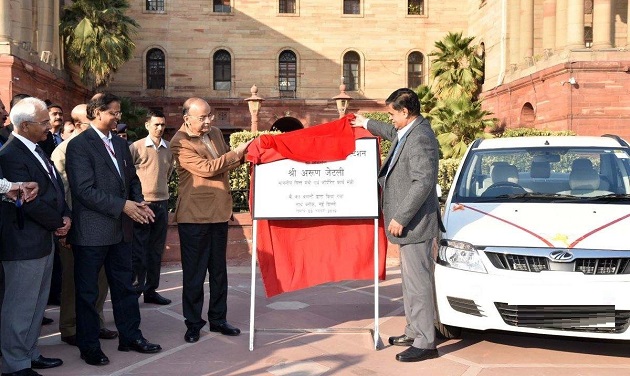Marking the adoption of e-mobility, Department of Economic Affairs, Ministry of Finance, Government of India has signed an agreement with Energy Efficiency Services Limited (EESL), an entity under Ministry of Power for deployment of 15 Electric Vehicles for their officers. Also, 28 charging points (24 Slow charging points, 4 Fast Charging Points) have been installed at North Block for charging these vehicles. With these 15 EVs, Department of Economic Affairs is expected to save over 36,000 litres of fuel every year and will also lead to a reduction of over 440 tonnes of CO2 annually.
Speaking on the occasion, the Union Minister of Finance and Corporate Affairs, Arun Jaitley, said, “Electric mobility, is an attractive, sustainable and profitable solution to mitigate the climate change and to reduce the risk posed by vehicular emission to public health. EVs have the potential to support India’s growth by enhancing manufacturing, job creation, and technical capabilities. We are glad to be a part of India’s mission of rapid adoption of e-mobility.”
Union Minister of State (IC) for Power and New & Renewable Energy, R K Singh said, “The Indian Government is committed to usher in an era of clean, green and future-oriented technologies in the country. Today, we have achieved yet another milestone in that direction. The Government is promoting e-mobility by taking a lead in changing the fleet of cars used for official purposes with electric cars and at the same time creating the right policy framework enabling this ecosystem and to support its adoption.”
With this development, the Department of Economic Affairs, Ministry of Finance begins its transition towards a reduced carbon footprint and a more environmentally sustainable future. It also marks its participation in India’s e-mobility goal. Several stakeholders across the nation are already implementing many initiatives to support electric mobility with more expected to join the effort.
The Department of Expenditure has also issued an office memorandum for all the government offices in Delhi/NCR to switch to electric vehicles. Adoption of electric vehicles will reduce dependence on oil imports and promote power capacity addition in India thereby enhancing energy security of the country. It will further reduce GHG emissions from the transport sector and also reduce the impact of pollution level in the cities.
EESL has received an encouraging response from Central Government departments and across states. So far, Agreements and MoUs have been signed with Central and State Government departments in Delhi, Maharashtra, Andhra Pradesh, Andaman & Nicobar Administration and Telangana. EESL is in advanced negotiations with other state governments across India. The recent guidelines on charging infrastructure provide a thrust to private & public charging stations ensuring access & availability for consumers. Further, the inclusion of CCS & CHAdeMO under charging infra standards is set to encourage automakers to offer higher range EVs. This will remove barriers like range and build confidence for EV consumers.
Towards enabling the Indian government’s e-mobility vision, EESL first plans to replace the government’s 5,00,000 conventional internal combustion engine (ICE) cars with electric variants. EESL has also established charging infrastructure across all states where EVs are being deployed.
The signing ceremony took place in the august presence of Arun Jaitley, Union Minister of Finance and Corporate Affairs; R.K. Singh, Minister of State (IC) for Power and New & Renewable Energy; Ajay Bhushan Pandey, Secretary, Department of Revenue; Ajay Narayan Jha, Finance Secretary & Secretary (Expenditure); Subhash Chandra Garg, Secretary, Department of Economic Affairs; and Ajay Bhalla, Secretary, Ministry of Power.







